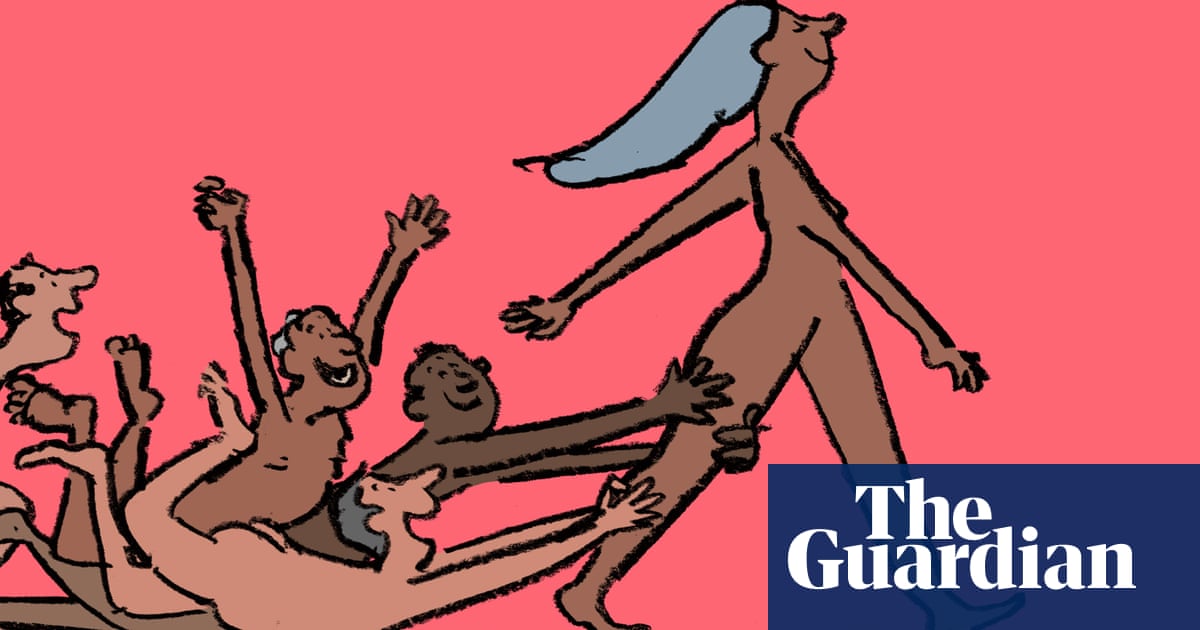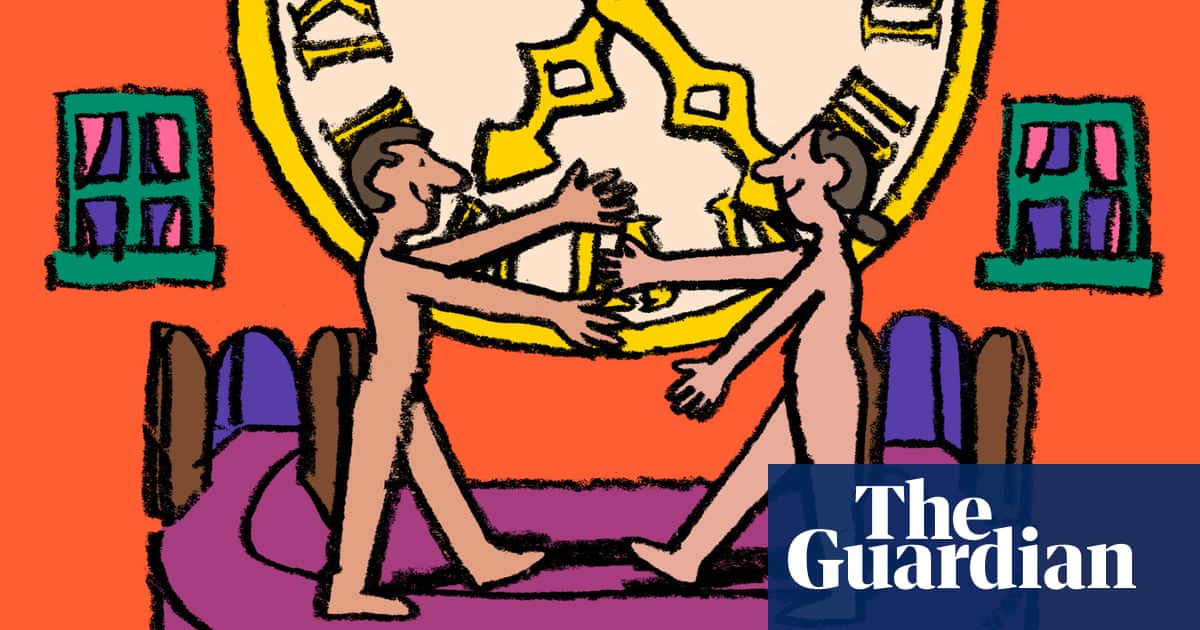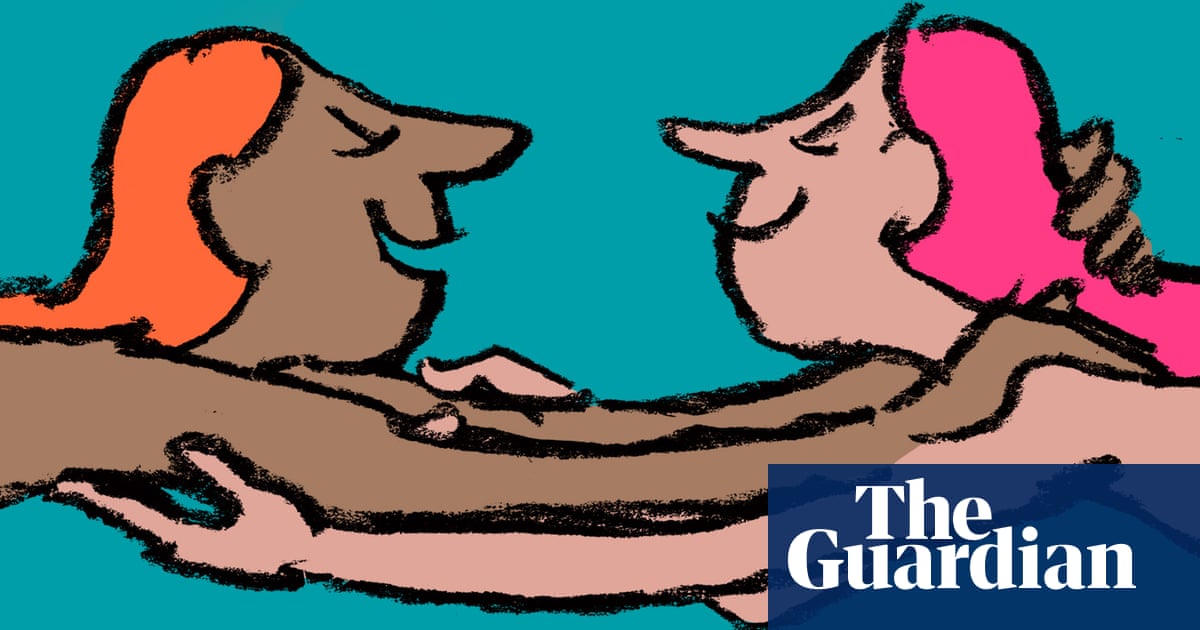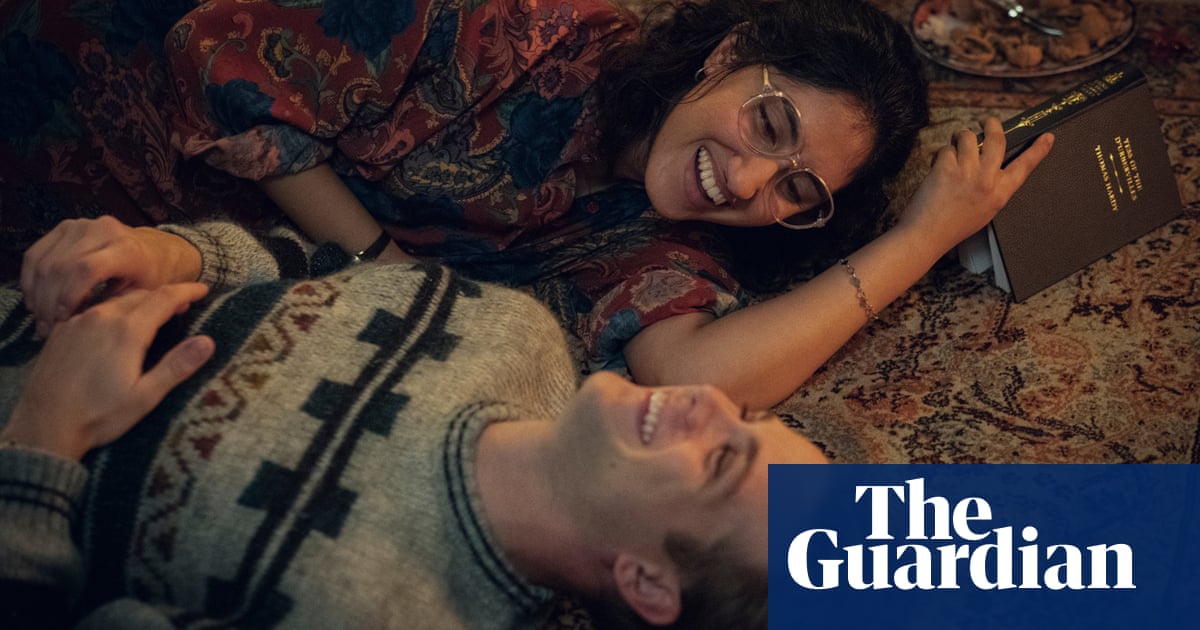
f the Roman poet Lucretius is to be believed, the whole universe is “a dance with Venus” – a sexual performance. “Love” just provides some of the footwork for amicable copulation. Or something to that effect. In his day, of course, with high child mortality and a ripe old age far from assured, reproduction must have been at the top of everyone’s list.
Nowadays, in the west, average life expectancy is much longer than it was in Rome at the beginning of the first millennium – indeed, a quarter of the population where I live can hardly walk in a straight line without assistance, let alone cavort around Venus’s dancefloor – yet we are still fixated as a society on arousal and performance. What is the point of living on into old age in such a society? Why soldier on? Even if you could still dance, who would dance with you?
For older men having sex is like “trying to shoot pool with a rope”, as George Burns put it. He was very old indeed for half of the 20th century, and chain-smoked cigars, so knew what he was talking about. (He claimed fresh air made him throw up. He died aged 100.) So what else is there? Billing and cooing? Cuddling and holding hands? Older women often complain they are practically invisible in a society that only values youth, but at least they don’t have Burns’s problem.
Gay men have both Burns’s problem and fail to be noticed, unless they overact shamelessly to draw attention to themselves. People walk straight into them in the street, waiters leave them sitting unwaited-upon at tables, shop assistants appear startled if they address them, looking around to see where the disembodied voice has come from.
Be that as it may, does it really matter if we’re out of the sexual running, even in a society as sex-obsessed as ours? Kevin Costner said that sex and golf were the two things you could always enjoy without being good at them, but even he may discover there are minimum performance standards. If Lucretius was right, and the universe is indeed a dance with Venus, does it matter if dancing is out of the question? If you want to grow old well, it’s worth being clear-eyed on this question. Among my older friends, there are several schools of thought.
Some think the moment they retired from the fray was when life finally burst into flower in every colour of the rainbow. Take Andrea, for instance. We were having muffins and tea at the gallery one afternoon, as we do from time to time when I’m in town. “Someone I was reading the other day,” she said, “… who on Earth was it? … names won’t come, will they, names evaporate … someone rather grand, as I remember … Anyway, she thinks that the best thing about being old is being released from the stranglehold of sex. She says at last she’s her own woman.” We chortled.
“Is that the way you feel?” I asked. “Not that I’d call you old …” A minefield, this topic.
“Pretty much, yes. Given a new lease on life. Don’t you?”
“No,” I said, “I don’t feel strangled at all, and I’m older and more crumpled than you are.”
“You’re only a bit older.”
“I find every second counts.” Life is indeed like a roll of toilet-paper, as some wit has observed: the closer you get to the end, the faster it goes until, with a little wobble, nothing’s left.
“Plato’s on your side, of course,” I mumbled through my mouthful of blueberry muffin.
“What did he say?”
“I’ll have to Google it.”
“Google it, then.”
“He said,” I replied, mobile phone in hand: “‘Old age has a great sense of calm and freedom; when the passions relax their hold, then … blah, blah, blah … we are free from the grasp of not just one mad master but of many.’”
“I couldn’t have put it better myself. The world opens up for you. You once were blind, and now can see. ‘Calm’ is going a bit far, though.”
“And Sophocles said something pithy, too, along the same lines … hang on, I’ll Google Sophocles as well. S-o-p-h-o-c-l-e-s o-l-d a-g-e s-e-x. Yes, here it is in Plato’s Republic. Isn’t it miraculous? Instant wisdom from 329BC: ‘Oh be quiet, man,’ he says – one of his companions is asking him if he can still get it up with women. ‘Honestly, I’m pretty happy to have left all that behind. It’s like I’ve finally made a getaway from some insane, sadistic taskmaster.’” (Mumble, mumble as I quickly read on. Nobody wants The Republic word for word over tea and blueberry muffins.)
“The rest of them, the other ‘old birds of wrinkly feather’ he’s drinking with take the opposite view. When they were young they spent ‘every night carousing, partying, whoring and whatnot’. I wonder what ‘whatnot’ was, by the way. Any ideas? The poor fellows are in anguish, ‘thinking that what they’ve lost is what really matters, that they really lived back then and so now they might as well be dead’.”
I suspect half the male population still thinks this, keeping suicide at bay with golf, guns, and a spot of gardening. It’s hard to feel even manly, let alone hungry for life, if your penis won’t stand up. It’s crucial – a matter of life and death – to have more strings to your bow than carousing, partying, whoring and whatnot.
There are quite a few men whose appetites stay strong into their advanced old age. Sir Francis Younghusband, a British army officer who invaded Tibet disastrously in 1904 with 29 trunks of clothes, fell head over heels in love in his late 70s, while still married, and stayed in love until he died (admittedly not too many years later). At the age of 73 Younghusband started an unusual new world religion, which still functions (the World Congress of Faiths). Nevertheless, Sir Francis was an exception, a man of inexhaustible mental and physical resources. This Imperial hero of the north-west frontier was never going to throw in the towel. A lot of men start throwing it in in early middle age. The thing is to do whatever you want to do without anxiety.
Two particular female friends of mine popped into my head, both love-struck anew at 75, writing daily love letters to their beloveds – their loves, their inamorati, their objects of desire. “Lovers” seems too colourless a word for the swains (both married men, although not, I gather, on active duty) who have brought them alive in a surge of passion when all seemed lost. My friend Barbara’s mother, Nancy, was still enjoying a busy love-life when she was well into her 90s: one Saturday afternoon in recent memory she was still pushing one gentleman caller out of the laundry window at the back of the house as the next one started jiggling his key in the door at the front. All the same, Andrea’s sense of a burgeoning new life as sexual obligations fall away strikes me as common.
The fly in the ointment for those of us, men or women, who are still open to amorous entanglements is that, while you may desire a whole slew of others , few are likely ever again to desire you. Virtually nobody at all on the face of the planet will desire you in the way you dream of, whatever the internet-dating sites may promise. Why would anyone desire you like that? Lovable – yes, desirable – not really. You can forget the Kama Sutra, you can put the Crow Position and the Position of a Herd of Cows right out of your mind, and concentrate on less athletic forms of intimacy and affection.
“What I love now, I think, is dalliance,” I said after a pause.
“What is dalliance exactly?” Andrea asked. “Isn’t it just a posh word for having an affair?”
“Oh, no, it’s got nothing to do with having an affair. An affair is serious and quite often a betrayal, while a dalliance is a game, it’s never a great love. It may even be chaste. There are rules, of course – times, places, moves.
“At its best, at its most skilfully and dangerously pursued, I really believe a dalliance is more delicious, more exciting, more … oh I don’t know … rejuvenating than anything else on Earth. And you can dally almost anywhere, too – at the back of a bus or on national television – I’ve seen Stephen Fry do it on QI with the whole world watching.”
“Is that what that’s called?” said Andrea.
“Perhaps that was more coquetry, now I come to think about it.” “I actually find,” says Andrea, “that as sex ebbs, the wider world gets more and more fascinating. Even dallying must take up time you could be spending on more interesting things.”
“Like what?” It was a serious question. What? Not quilting or taking classes in Chinese, presumably.
“This, for example – sitting here with an old friend. A thousand other things – when sex stops hogging the limelight. With sex out of the way, you can let little things in your life grow into big things, and a couple of big things shrink till they’re little. I’ve gone back to the piano again, I’ve taken up bonsai, I read whatever I want whenever I want. “But friendship, I think, in my case, is what I enjoy having more time for now, above all for my old friends – people I just love.”
I nodded. That was precisely it. Friendship. The love that can never be bought.
When the celebrated astronomer and astrophysicist Carl Sagan wrote that for infinitesimally small creatures such as we are, the vastness of the universe is bearable “only through love”, I can imagine he had in mind not just a mother’s for her child or a married couple’s for each other but a kaleidoscopic panoply of possible loves – passionate, pitying, playful (some friends are simply play-friends, a bit of a lark), and also amorous, tender, ethereal, muscular, mystical, animal, blissful, businesslike, blindly jealous or just blind, a virtually boundless web of intensely felt, vivifying attachments.
Chillingly (since love is so fragile, so quick to dry up or disappear, leaving an infinite emptiness behind), I think Sagan was right, which is why the night sky is terrifying to the point of ecstasy sometimes. And of all these loves I think friendship is the most difficult and most rewarding kind. Souls you love as your own soul. There won’t be many of these souls – a handful will do – but each will be as big as the moon. (Not that we believe in souls.) Yes, affairs or even just being dizzy with desire, can blind you to a whole array of other kinds, less sensual kinds, of intimacy.
For all that, generally speaking, in our society these days it’s the kind of love that marriage celebrates that is our highest goal in life. Even some homosexuals see marriage (of all things) as the supreme good. Love is not enough, it appears, nor friendship, in their boundless variety: love must also be hopeful of monogamy and publicly solemnised if it is to be prized above all else. Many males live out their entire lives without any friends at all, just a spouse.
Indeed, I doubt my own father, for all his affability and warm-heartedness, had any friends – companions at the bowls club latterly, but nobody I’d call a friend, no one he loved intensely simply because they were who they were, and he was who he was (if I might resort to Montaigne’s arresting description of his friendship for Étienne de La Boétie).
Yet, until the modern era, if historians such as AC Grayling are to be believed, it was friendship in its many forms that was humanity’s highest goal – apart from a love for God, of course, which for the deeply devout made friendship dicey. Marriage underpinned the social structure, obviously, and love for one’s spouse, if it blossomed, made the arrangement much more pleasurable, but it was friendship that gave life its charge, its zest, its exhilaration and its lasting joy.
Outside on the street, as the sun dipped behind the skyscrapers across the park, Andrea and I said goodbye at the bus stop, she almost wraithlike in her faded pinks and greys at that time of day – a tenderly mortal moment, as leave-takings always are at a certain age, even when you’re as fit as a fiddle and it’s just the bus to Birchgrove. Off she sailed into the dusk, which was heavy with the smell of squashed figs. What could be headier? Dusk is a delicious time, even in colder climates, a sensual time, a time of suddenly sharpened appetites. When evening falls, as the American writer James Salter once worded it in a piece he wrote for that journal of sharpened appetites, GQ, “there is the call of the boulevards”.
Making my way through the dark to my hotel that evening, the city a waterfall of lights against the blue-black velvet of the sky, I reflected on how faint the “call of the boulevards” was, or at least how infrequent it had become, whereas the call of an early night in bed with a good book was more and more often irresistible.
As the city came out to play – as lights came on and bands struck up and thousands, even hundreds of thousands, of players and spectators dressed and coiffed to catch the eye milled in the streets and bars, excited – I headed back for some “fruitful monotony”, if I might borrow Bertrand Russell’s brilliant term for one of happiness’s vital ingredients. I would first order room service, and then fructify at my leisure.
This is an edited extract from The Time of our Lives – Growing Older Well, by Robert Dessaix (Brio, $32.99)












